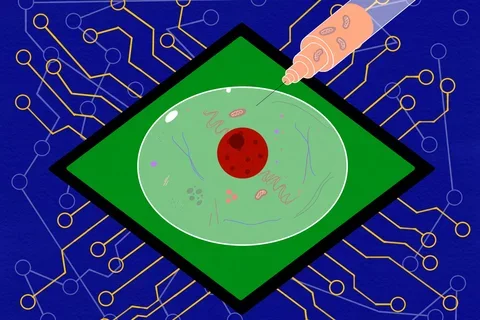MitoPunch technology featured in Daily Bruin

Madelynn Mackenzie, for the Daily Bruin, reports on a groundbreaking development. UCLA researchers, including Alexander Sercel and Alexander Patananan, have introduced MitoPunch, a revolutionary technology facilitating the swift transfer of mitochondria between cells. Directed by Dr. Michael Teitell, PI and the director of the UCLA Jonsson Comprehensive Cancer Center, this innovation allows for the mass production of reprogrammable cells with specific mitochondrial and nuclear DNA pairings.
Mitochondria, the energy-producing components crucial for cell function, depend on precise DNA combinations. MitoPunch addresses this by enabling the transfer of mitochondria into multiple cells simultaneously. Teitell, also a Pathology and Laboratory Medicine Professor, emphasizes the importance of understanding these DNA pairings, particularly in the context of diseases like MELAS and MERRF Syndromes, which can result from mismatched DNA sequences in the mitochondria and nucleus.
Spearheading the study, Sercel, a molecular biology doctoral student, underscores the unique contribution of MitoPunch. This tool allows researchers to recreate specific DNA pairings associated with diseases, offering an unprecedented opportunity to delve into the nuanced presentations of diseases. Furthermore, Sercel envisions the potential transformation of this research into cellular therapies, generating cells with tailor-made DNA combinations.
Patananan, a co-lead author and postdoctoral scholar, highlights the tool's ability to transfer mitochondria into noncancerous human cells. This achievement is a groundbreaking step, enabling the transformation of such cells into stem cells with the potential to differentiate into various cell types within the body. Patananan sees this as a significant advancement, allowing researchers to model interactions between mitochondrial and nuclear DNA in clinically relevant contexts.
Notably, MitoPunch stands out for its efficiency, capable of transferring mitochondria into 100,000 cells or more within a second. This efficiency marks a departure from previous methods that could only transfer mitochondria into cells one at a time. Moreover, this technology, with a cost as low as $50, promises to make mitochondrial research more accessible, reducing barriers for research labs and ushering in a new era of exploration into the intricate world of mitochondrial and nuclear DNA pairings.